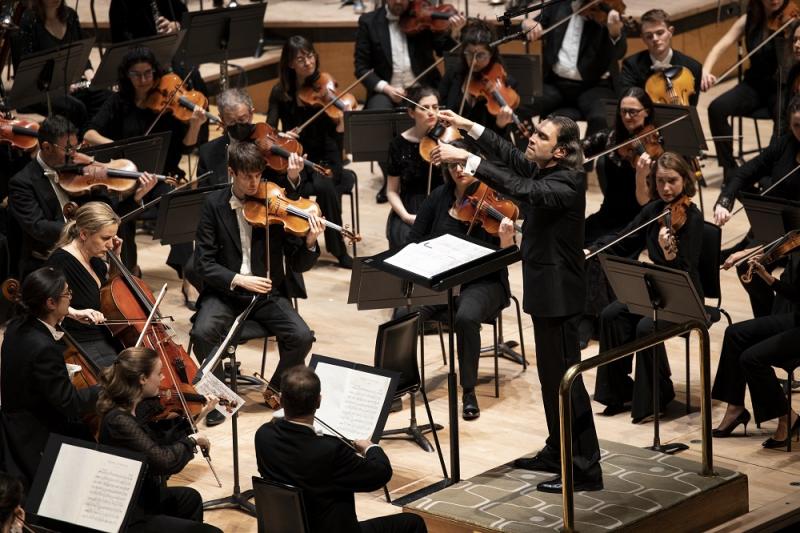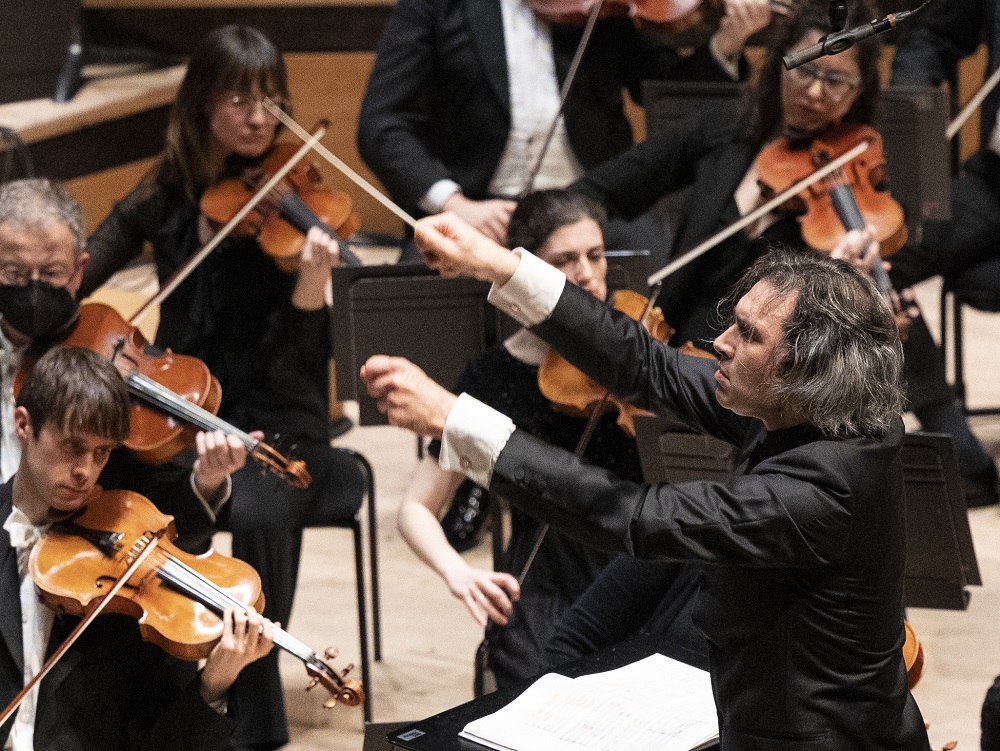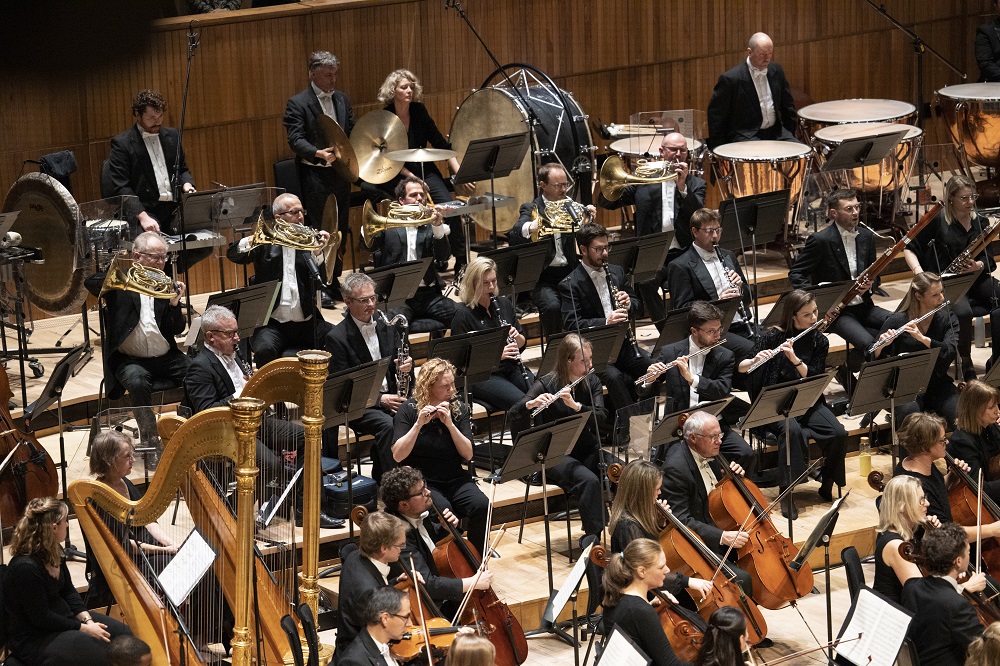Mahler’s Ninth Symphony, LPO, Jurowski, RFH review - a performance to make the heart beat faster | reviews, news & interviews
Mahler’s Ninth Symphony, LPO, Jurowski, RFH review - a performance to make the heart beat faster
Mahler’s Ninth Symphony, LPO, Jurowski, RFH review - a performance to make the heart beat faster
A great conductor finds a line through Mahler’s most intense glooms and optimisms

This greatest of symphonies starts with what’s plausibly described as arrhythmia of the heart, so it shouldn’t have been surprising to find my own racing as Vladimir Jurowski drove a line through the peaks, troughs and convalescences of its massive first movement. There were more shocks to the system throughout, but all of them came from an interpretation so staggeringly well prepared that every texture sounded newly conceived.
More of the personal, if you don’t mind. The most extraordinary concert I’ve ever attended was Claudio Abbado’s interpretation of the Ninth with the Lucerne Festival Orchestra. It seemed wise to leave well alone, at least in terms of live performance, for some years. Ádám Fischer and the Vienna Philharmonic had to be one exception – a disappointment – and Jurowski another, guaranteed to bring new insights in returning to the London Philharmonic Orchestra, now, it seems, in very good hands under his successor as principal conductor, Edward Gardner.  Once past the problem of the Royal Festival Hall’s dry acoustics, which hardly support the most luminous of cradlings, they came thick, as in transparent, and fast, but never too fast; the opening Andante comodo is a symphony in itself – no wonder Jurowski took a seat for a couple of minutes after it – and needs both a proper momentum as the conductor negotiates more highs and lows than in any other symphonic movement, and a free expansion for the sudden moments of greatest optimism, usually followed by a dreadful tumble into the abyss.
Once past the problem of the Royal Festival Hall’s dry acoustics, which hardly support the most luminous of cradlings, they came thick, as in transparent, and fast, but never too fast; the opening Andante comodo is a symphony in itself – no wonder Jurowski took a seat for a couple of minutes after it – and needs both a proper momentum as the conductor negotiates more highs and lows than in any other symphonic movement, and a free expansion for the sudden moments of greatest optimism, usually followed by a dreadful tumble into the abyss.
Jurowski's balancing-act in these dual qualities added up to the firmest of bases, and on that the London Philharmonic built both collectively, underpinned by ten double basses in a hyper-rich string department, and individually; kudos to all the woodwind, but especially to the achingly vocalised solos of Juliette Bausor, leading the four-flutes-and-piccolo team, the lurid sounds of Thomas Watmough’s E flat clarinet and Jonathan Davies drawing attention to some bassoon lines I’d never noticed before.  Inner lines were always clear even in the most fraught climaxes and the almost relentless, bludgeoning counterpoint of the Rondo Burleske; the tricky tempo changes in the three contrasting moods of the Scherzo came with brilliant articulation; and the final hymn – of death or farewell, it’s so hard to say which as it churns you up – had terrifyingly consistent application of full string sound, never mawkish or lingering, with plenty of atmosphere for the haunting twilight zones in between. The ultimate cries and whispers, which always have to be remarkable, stilled even the most determined coughers in the audience.
Inner lines were always clear even in the most fraught climaxes and the almost relentless, bludgeoning counterpoint of the Rondo Burleske; the tricky tempo changes in the three contrasting moods of the Scherzo came with brilliant articulation; and the final hymn – of death or farewell, it’s so hard to say which as it churns you up – had terrifyingly consistent application of full string sound, never mawkish or lingering, with plenty of atmosphere for the haunting twilight zones in between. The ultimate cries and whispers, which always have to be remarkable, stilled even the most determined coughers in the audience.
This is a performance, like Abbado’s, which I want to hear again as soon as possible: if Jurowski no longer has the chief post to feature it again in future seasons, as he did with the Second, "Resurrection", Symphony – he is now Conductor Laureate – it looks as if we’ll have a recording on the LPO Live label, where this greatest of conductors seems to be setting down a complete Mahler cycle. May it arrive soonest.
rating
Explore topics
Share this article
The future of Arts Journalism
You can stop theartsdesk.com closing!
We urgently need financing to survive. Our fundraising drive has thus far raised £49,000 but we need to reach £100,000 or we will be forced to close. Please contribute here: https://gofund.me/c3f6033d
And if you can forward this information to anyone who might assist, we’d be grateful.

Subscribe to theartsdesk.com
Thank you for continuing to read our work on theartsdesk.com. For unlimited access to every article in its entirety, including our archive of more than 15,000 pieces, we're asking for £5 per month or £40 per year. We feel it's a very good deal, and hope you do too.
To take a subscription now simply click here.
And if you're looking for that extra gift for a friend or family member, why not treat them to a theartsdesk.com gift subscription?
more Classical music
 Bizet in 150th anniversary year: rich and rare French offerings from Palazzetto Bru Zane
Specialists in French romantic music unveil a treasure trove both live and on disc
Bizet in 150th anniversary year: rich and rare French offerings from Palazzetto Bru Zane
Specialists in French romantic music unveil a treasure trove both live and on disc
 Scottish Chamber Orchestra, Ibragimova, Queen’s Hall, Edinburgh review - rarities, novelties and drumrolls
A pity the SCO didn't pick a better showcase for a shining guest artist
Scottish Chamber Orchestra, Ibragimova, Queen’s Hall, Edinburgh review - rarities, novelties and drumrolls
A pity the SCO didn't pick a better showcase for a shining guest artist
 Kilsby, Parkes, Sinfonia of London, Wilson, Barbican review - string things zing and sing in expert hands
British masterpieces for strings plus other-worldly tenor and horn - and a muscular rarity
Kilsby, Parkes, Sinfonia of London, Wilson, Barbican review - string things zing and sing in expert hands
British masterpieces for strings plus other-worldly tenor and horn - and a muscular rarity
 From Historical to Hip-Hop, Classically Black Music Festival, Kings Place review - a cluster of impressive stars for the future
From quasi-Mozartian elegance to the gritty humour of a kitchen inspection
From Historical to Hip-Hop, Classically Black Music Festival, Kings Place review - a cluster of impressive stars for the future
From quasi-Mozartian elegance to the gritty humour of a kitchen inspection
 Shibe, LSO, Adès, Barbican review - gaudy and glorious new music alongside serene Sibelius
Adès’s passion makes persuasive case for the music he loves, both new and old
Shibe, LSO, Adès, Barbican review - gaudy and glorious new music alongside serene Sibelius
Adès’s passion makes persuasive case for the music he loves, both new and old
 Anja Mittermüller, Richard Fu, Wigmore Hall review - a glorious hall debut
The Austrian mezzo shines - at the age of 22
Anja Mittermüller, Richard Fu, Wigmore Hall review - a glorious hall debut
The Austrian mezzo shines - at the age of 22
 First Person: clarinettist Oliver Pashley on the new horizons of The Hermes Experiment's latest album
Compositions by members of this unusual quartet feature for the first time
First Person: clarinettist Oliver Pashley on the new horizons of The Hermes Experiment's latest album
Compositions by members of this unusual quartet feature for the first time
 Gesualdo Passione, Les Arts Florissants, Amala Dior Company, Barbican review - inspired collaboration excavates the music's humanity
At times it was like watching an anarchic religious procession
Gesualdo Passione, Les Arts Florissants, Amala Dior Company, Barbican review - inspired collaboration excavates the music's humanity
At times it was like watching an anarchic religious procession
 Classical CDs: Camels, concrete and cabaret
An influential American composer's 90th birthday box, plus British piano concertos and a father-and-son duo
Classical CDs: Camels, concrete and cabaret
An influential American composer's 90th birthday box, plus British piano concertos and a father-and-son duo
 Cockerham, Manchester Camerata, Sheen, Martin Harris Centre, Manchester review - re-enacting the dawn of modernism
Two UK premieres added to three miniatures from a seminal event of January 1914
Cockerham, Manchester Camerata, Sheen, Martin Harris Centre, Manchester review - re-enacting the dawn of modernism
Two UK premieres added to three miniatures from a seminal event of January 1914
 Kempf, Brno Philharmonic, Davies, Bridgewater Hall, Manchester review - European tradition meets American jazz
Bouncing Czechs enjoy their Gershwin and Brubeck alongside Janáček and Dvořák
Kempf, Brno Philharmonic, Davies, Bridgewater Hall, Manchester review - European tradition meets American jazz
Bouncing Czechs enjoy their Gershwin and Brubeck alongside Janáček and Dvořák
 Solomon, OAE, Butt, QEH review - daft Biblical whitewashing with great choruses
Even a top soprano and mezzo can’t make this Handel paean wholly convincing
Solomon, OAE, Butt, QEH review - daft Biblical whitewashing with great choruses
Even a top soprano and mezzo can’t make this Handel paean wholly convincing

Add comment